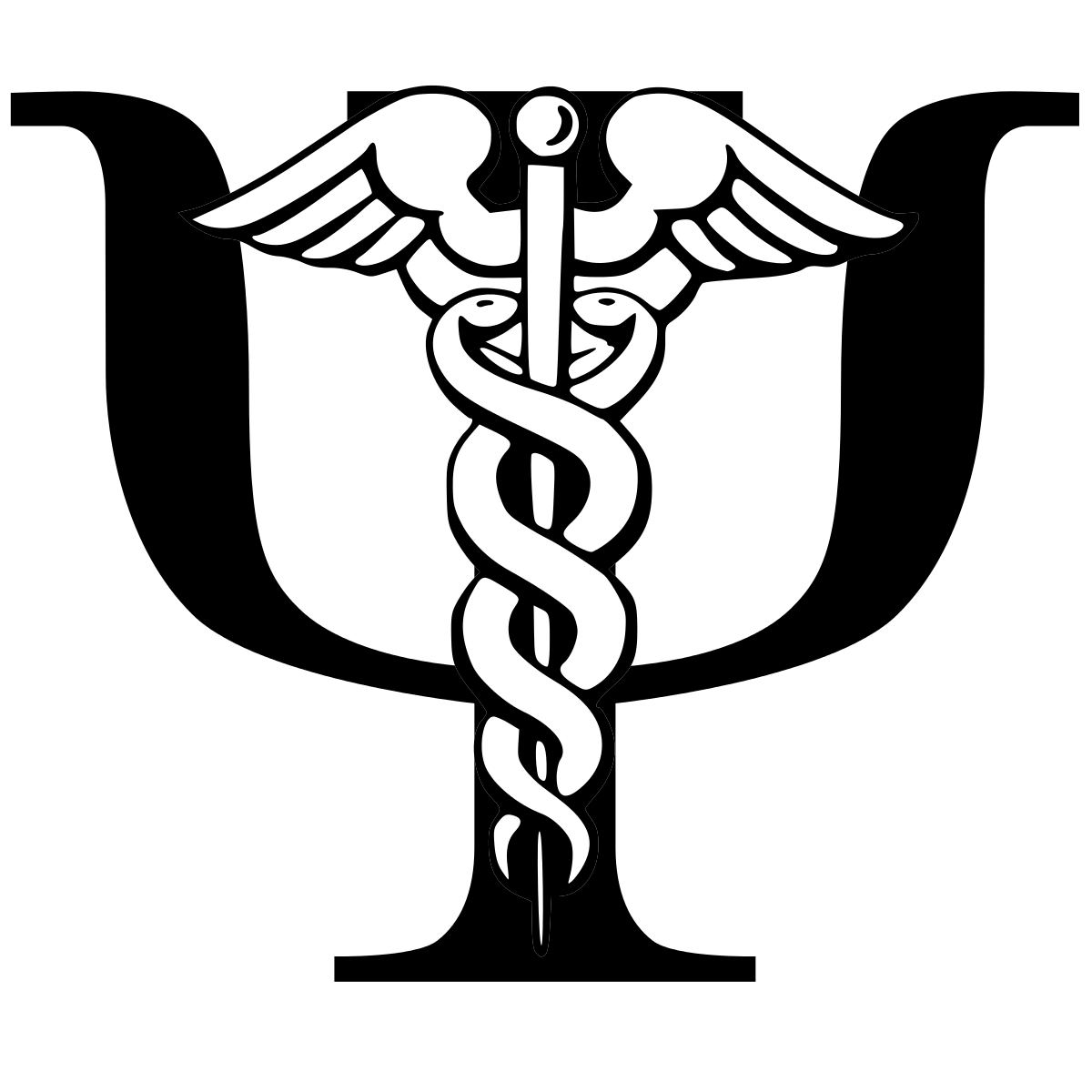More languages
More actions
(Created page with "Psychiatry is a pseudoscience that gives drugs to patients based on the idea of mental disorders, which are not based on any form of material analysis or science. == History == Bethlehem Royal Hospital is the first psychiatric institution formed in 1377. === Formation of the Diagnostic and Statistical Manual === The Diagnostic and Statistical Manual (DSM) was formed in 1952 by the American Psychiatric Association. == Connections to the Pharmacy Industry ==...") |
mNo edit summary Tag: Visual edit |
||
| (24 intermediate revisions by 4 users not shown) | |||
| Line 1: | Line 1: | ||
Psychiatry is a | {{Message box/ideologicalconflict}}[[File:Psi and Caduceus symbol.png|thumb|224x224px|Symbol often used to represent psychiatry]]{{Distinguish|[[psychology]]}} | ||
'''Psychiatry''' is a field which is concerned with the analysis and treatment of mental health disorders. It is treated as a medical specialty by governments, psychiatrist institutions, medical schools and pharmaceutical companies.<ref>{{Web citation|author=Renato D. Alarcón|newspaper=Psychiatric Times|title=Psychiatry and Its Dichotomies|date=2016-5-20|url=https://www.psychiatrictimes.com/view/psychiatry-and-its-dichotomies|retrieved=2022-9-6}}</ref> | |||
Psychiatrists are doctors that have the ability to diagnose people with mental disorders. They have graduated from medical school and chose to specialise in psychiatry after their residency (in-person training in a hospital or clinic for a few years). This can make them quite different to psychotherapists (a more general term usually given to clinical psychologists), but allows them to prescribe medication. | |||
==History== | |||
Bethlehem Royal Hospital, the first psychiatric institution in the world, formed in 1377. | |||
===Nazi Germany=== | |||
== Connections to | Psychiatry was a tool used in [[German Reich (1933–1945)|Nazi Germany]] to justify the mass extermination of [[Disability|disabled]] people.<ref>{{Citation|title=Psychiatry during the Nazi era: ethical lessons for the modern | ||
professional|author=Rael D Strous|doi=10.1186/1744-859X-6-8|publisher=Annals of General Psychiatry}}</ref> | |||
===Formation of the Diagnostic and Statistical Manual=== | |||
The first version of the [[Diagnostic and Statistical Manual]] (DSM) was formed in 1952 by the [[American Psychiatric Association]]. The DSM is currently on its fifth version, released in 2013. While it is mostly meant for the [[United States of America|USA]], psychiatrist associations the world over use it as an official guide to diagnose. | |||
==Criticism== | |||
=== Anti-psychiatry movement === | |||
{{Main article|Anti-psychiatry}} | |||
Psychiatry is denounced as a pseudoscience by some anti-psychiatry advocates and physicians, such as Peter Gøtzsche.<ref>{{Citation|title=Deadly Psychiatry and Organised Denial|author=Peter C. Gøtzsche|year=2015|publisher=People's Press|isbn=978-87-7159-623-6}}</ref><ref>{{Citation|author=Peter C. Gøtzsche|publisher=Taylor & Francis|year=2013|isbn=9781846198847|title=Deadly Medicines and Organised Crime: How Big Pharma Has Corrupted Healthcare }}</ref> | |||
===Connections to pharmacy industry=== | |||
Psychiatry is highly connected to the pharmaceutical industry. | Psychiatry is highly connected to the pharmaceutical industry. | ||
== | In 2008 APA was the focus of congressional investigations on how pharmaceutical industry money shapes the practices of nonprofit organizations that purport to be independent. The drug industry accounted in 2006 for about 30 percent of the association's $62.5 million in financing, half through drug advertisements in its journals and meeting exhibits, and the other half sponsoring fellowships, conferences and industry symposiums at its annual meeting.<ref>{{News citation|url=https://www.nytimes.com/2008/07/12/washington/12psych.html|title=Psychiatric Group Faces Scrutiny Over Drug Industry Ties|newspaper=The New York Times|author=Benedict Carey, Gardiner Harris|date=2008-07-12}}</ref> | ||
= References = | == References == | ||
<references /> | |||
[[Category:Psychiatry]] | |||
Latest revision as of 19:28, 28 January 2023
This article is currently undergoing an ideological dispute over its content; be critical of the information presented, and make sure to establish a consensus with comrades before making edits. |

- Not to be confused with psychology
Psychiatry is a field which is concerned with the analysis and treatment of mental health disorders. It is treated as a medical specialty by governments, psychiatrist institutions, medical schools and pharmaceutical companies.[1]
Psychiatrists are doctors that have the ability to diagnose people with mental disorders. They have graduated from medical school and chose to specialise in psychiatry after their residency (in-person training in a hospital or clinic for a few years). This can make them quite different to psychotherapists (a more general term usually given to clinical psychologists), but allows them to prescribe medication.
History[edit | edit source]
Bethlehem Royal Hospital, the first psychiatric institution in the world, formed in 1377.
Nazi Germany[edit | edit source]
Psychiatry was a tool used in Nazi Germany to justify the mass extermination of disabled people.[2]
Formation of the Diagnostic and Statistical Manual[edit | edit source]
The first version of the Diagnostic and Statistical Manual (DSM) was formed in 1952 by the American Psychiatric Association. The DSM is currently on its fifth version, released in 2013. While it is mostly meant for the USA, psychiatrist associations the world over use it as an official guide to diagnose.
Criticism[edit | edit source]
Anti-psychiatry movement[edit | edit source]
See main article: Anti-psychiatry
Psychiatry is denounced as a pseudoscience by some anti-psychiatry advocates and physicians, such as Peter Gøtzsche.[3][4]
Connections to pharmacy industry[edit | edit source]
Psychiatry is highly connected to the pharmaceutical industry.
In 2008 APA was the focus of congressional investigations on how pharmaceutical industry money shapes the practices of nonprofit organizations that purport to be independent. The drug industry accounted in 2006 for about 30 percent of the association's $62.5 million in financing, half through drug advertisements in its journals and meeting exhibits, and the other half sponsoring fellowships, conferences and industry symposiums at its annual meeting.[5]
References[edit | edit source]
- ↑ Renato D. Alarcón (2016-5-20). "Psychiatry and Its Dichotomies" Psychiatric Times. Retrieved 2022-9-6.
- ↑ Rael D Strous. Psychiatry during the Nazi era: ethical lessons for the modern professional. Annals of General Psychiatry. doi: 10.1186/1744-859X-6-8 [HUB]
- ↑ Peter C. Gøtzsche (2015). Deadly Psychiatry and Organised Denial. People's Press. ISBN 978-87-7159-623-6
- ↑ Peter C. Gøtzsche (2013). Deadly Medicines and Organised Crime: How Big Pharma Has Corrupted Healthcare. Taylor & Francis. ISBN 9781846198847
- ↑ Benedict Carey, Gardiner Harris (2008-07-12). "Psychiatric Group Faces Scrutiny Over Drug Industry Ties" The New York Times.
